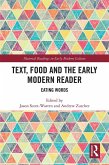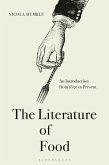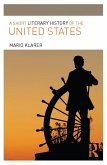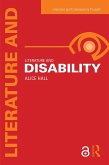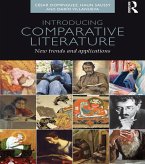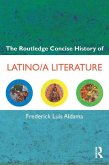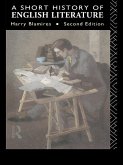Charlotte Boyce, Joan Fitzpatrick
A History of Food in Literature (eBook, ePUB)
From the Fourteenth Century to the Present
39,95 €
39,95 €
inkl. MwSt.
Sofort per Download lieferbar

20 °P sammeln
39,95 €
Als Download kaufen

39,95 €
inkl. MwSt.
Sofort per Download lieferbar

20 °P sammeln
Jetzt verschenken
Alle Infos zum eBook verschenken
39,95 €
inkl. MwSt.
Sofort per Download lieferbar
Alle Infos zum eBook verschenken

20 °P sammeln
Charlotte Boyce, Joan Fitzpatrick
A History of Food in Literature (eBook, ePUB)
From the Fourteenth Century to the Present
- Format: ePub
- Merkliste
- Auf die Merkliste
- Bewerten Bewerten
- Teilen
- Produkt teilen
- Produkterinnerung
- Produkterinnerung

Bitte loggen Sie sich zunächst in Ihr Kundenkonto ein oder registrieren Sie sich bei
bücher.de, um das eBook-Abo tolino select nutzen zu können.
Hier können Sie sich einloggen
Hier können Sie sich einloggen
Sie sind bereits eingeloggt. Klicken Sie auf 2. tolino select Abo, um fortzufahren.

Bitte loggen Sie sich zunächst in Ihr Kundenkonto ein oder registrieren Sie sich bei bücher.de, um das eBook-Abo tolino select nutzen zu können.
A History of Food in Literature provides a clear and comprehensive overview of significant episodes of food and its consumption in major canonical literary works from the medieval period to the twenty-first century. Organised chronologically and examining certain key writers from every period, including Chaucer, Shakespeare, Austen and Dickens, this book's enlightening critical analysis makes it relevant for anyone interested in the study of food and literature.
- Geräte: eReader
- mit Kopierschutz
- eBook Hilfe
- Größe: 1.91MB
Andere Kunden interessierten sich auch für
![Text, Food and the Early Modern Reader (eBook, ePUB) Text, Food and the Early Modern Reader (eBook, ePUB)]() Jason Scott-WarrenText, Food and the Early Modern Reader (eBook, ePUB)41,95 €
Jason Scott-WarrenText, Food and the Early Modern Reader (eBook, ePUB)41,95 €![The Literature of Food (eBook, ePUB) The Literature of Food (eBook, ePUB)]() Nicola HumbleThe Literature of Food (eBook, ePUB)24,95 €
Nicola HumbleThe Literature of Food (eBook, ePUB)24,95 €![A Short Literary History of the United States (eBook, ePUB) A Short Literary History of the United States (eBook, ePUB)]() Mario KlarerA Short Literary History of the United States (eBook, ePUB)23,95 €
Mario KlarerA Short Literary History of the United States (eBook, ePUB)23,95 €![Literature and Disability (eBook, ePUB) Literature and Disability (eBook, ePUB)]() Alice HallLiterature and Disability (eBook, ePUB)0,99 €
Alice HallLiterature and Disability (eBook, ePUB)0,99 €![Introducing Comparative Literature (eBook, ePUB) Introducing Comparative Literature (eBook, ePUB)]() César DomínguezIntroducing Comparative Literature (eBook, ePUB)37,95 €
César DomínguezIntroducing Comparative Literature (eBook, ePUB)37,95 €![The Routledge Concise History of Latino/a Literature (eBook, ePUB) The Routledge Concise History of Latino/a Literature (eBook, ePUB)]() Frederick Luis AldamaThe Routledge Concise History of Latino/a Literature (eBook, ePUB)41,95 €
Frederick Luis AldamaThe Routledge Concise History of Latino/a Literature (eBook, ePUB)41,95 €![A Short History of English Literature (eBook, ePUB) A Short History of English Literature (eBook, ePUB)]() Harry BlamiresA Short History of English Literature (eBook, ePUB)21,95 €
Harry BlamiresA Short History of English Literature (eBook, ePUB)21,95 €-
-
-
A History of Food in Literature provides a clear and comprehensive overview of significant episodes of food and its consumption in major canonical literary works from the medieval period to the twenty-first century. Organised chronologically and examining certain key writers from every period, including Chaucer, Shakespeare, Austen and Dickens, this book's enlightening critical analysis makes it relevant for anyone interested in the study of food and literature.
Dieser Download kann aus rechtlichen Gründen nur mit Rechnungsadresse in A, B, BG, CY, CZ, D, DK, EW, E, FIN, F, GR, HR, H, IRL, I, LT, L, LR, M, NL, PL, P, R, S, SLO, SK ausgeliefert werden.
Produktdetails
- Produktdetails
- Verlag: Taylor & Francis
- Seitenzahl: 322
- Erscheinungstermin: 18. Mai 2017
- Englisch
- ISBN-13: 9781135022068
- Artikelnr.: 48418150
- Verlag: Taylor & Francis
- Seitenzahl: 322
- Erscheinungstermin: 18. Mai 2017
- Englisch
- ISBN-13: 9781135022068
- Artikelnr.: 48418150
- Herstellerkennzeichnung Die Herstellerinformationen sind derzeit nicht verfügbar.
Charlotte Boyce is Senior Lecturer in English Literature at the University of Portsmouth, UK.
Joan Fitzpatrick is Senior Lecturer in English at Loughborough University, UK.
Joan Fitzpatrick is Senior Lecturer in English at Loughborough University, UK.
Chapter 1: Pilgrims and partridges (1350-1550); William Langland
Piers Plowman (late 1300s); Anon.
Gawain and the Green Knight (late 1300s); Geoffrey Chaucer
The Canterbury Tales (late 1300s); Margery Kempe
The Book of Margery Kempe (early 1400s); Chapter 2: Bodily health and spiritual wealth (1550-1640); Edmund Spenser
The Faerie Queene (1590 and 1596); Willliam Shakespeare
various works; Francis Beaumont and John Fletcher's The Woman Hater (1607); Ben Jonson
Valpone (1605)
The Alchemist (1616) and Bartholomew Fair (1631); Chapter 3: Adventures in England and beyond its shores (1650-1750); John Milton
Paradise Lost (1667); John Milton
Paradise Regained (1671); Daniel Defoe
Robinson Crusoe (1719); Jonathan Swift
Gulliver's Travels (1729); Henry Fielding
Joseph Andrews (1742) and Tom Jones (1749); Chapter 4: Luxuxy
gluttony
domestic economy and ethical eating (1750-1830); Anon.
The Tryal of the Lady Allurea Luxury (1757); Tobias Smollett
The Expedition of Humphry Clinker (1771); Robert Ferguson
'The Farmer's Ingle' and 'To the Principal and Professors of the University of St Andrews
on Their Superb Treat to Dr Samuel Johnson' (1773); Robert Burns
'Address to a Haggis' and 'The Cotter's Saturday Night' (1786); Charlotte Smith
Desmond (1792); Hannah More
The Way to Plenty (1795) and The Cottage Cook (1797); Mary Birkett
A Poem on the African Slave Trade (1792); Jane Austen
Sense and Sensibility (1811)
Mansfield Park (1814) and Emma (1815); Percy Bysshe Shelley
Queen Mab; A Philosophical Poem with Notes and A Vindication of Natural Diet (1813); Mary Shelley
Frankenstein
or the Modern Prometheus (1818); George Gordon
Lord Byron
The Corsair (1814) and Don Juan (c. 1819-1824); John Keats
Endymion (1818)
The Fall of Hyperion (written c. 1819-1821)
The Eve of St. Agnes and 'La Belle Dame sans Merci' (1820); Chapter 5: 'Come buy
come buy . . . I have no copper in my purse': hunger
indulgence desire and adulteration (1830-1898); Charles Dickens
various works; William Makepeace Thackeray
Vanity Fair (1847-1848); Anne Brontë
The Tenant of Wildfell Hall (1848); Charlotte Brontë
Jane Eyre (1847) and Shirley (1849); Emily Brontë
Wuthering Heights (1847); Christina Rossetti
'Goblin Market' (1862); George Eliot
'Brother Jacob'; Lewis Carroll
Alice's Adventures in Wonderland (1865) and Through the Looking Glass
and Whaht Alice Found There (1871); Sarah Grand
The Beth Book
Being a Study of the Life of Elizabeth Caldwell Maclure
a Woman of Genius (1897); Chapter 6: You are what you eat?: Food and the politics of identity (1899-2003); Joseph Conrad
Heart of Darkness (1899) and 'Falk: A Reminiscence' (1903); James Joyce
Ulysses (1922); Virginia Woolf
To the Lighthouse (1927) and The Waves (1931); Angela Carter
The Magic Toyshop (1967) and Margaret Atwood
The Edible Woman (1969); Salman Rushdie
Midnight's Children (1981); Andrea Levy
Fruit of the Lemon (1999)
Zadie Smith
White Teeth (2000) and Monica Ali
Brick Lane (2003); Conclusion
Piers Plowman (late 1300s); Anon.
Gawain and the Green Knight (late 1300s); Geoffrey Chaucer
The Canterbury Tales (late 1300s); Margery Kempe
The Book of Margery Kempe (early 1400s); Chapter 2: Bodily health and spiritual wealth (1550-1640); Edmund Spenser
The Faerie Queene (1590 and 1596); Willliam Shakespeare
various works; Francis Beaumont and John Fletcher's The Woman Hater (1607); Ben Jonson
Valpone (1605)
The Alchemist (1616) and Bartholomew Fair (1631); Chapter 3: Adventures in England and beyond its shores (1650-1750); John Milton
Paradise Lost (1667); John Milton
Paradise Regained (1671); Daniel Defoe
Robinson Crusoe (1719); Jonathan Swift
Gulliver's Travels (1729); Henry Fielding
Joseph Andrews (1742) and Tom Jones (1749); Chapter 4: Luxuxy
gluttony
domestic economy and ethical eating (1750-1830); Anon.
The Tryal of the Lady Allurea Luxury (1757); Tobias Smollett
The Expedition of Humphry Clinker (1771); Robert Ferguson
'The Farmer's Ingle' and 'To the Principal and Professors of the University of St Andrews
on Their Superb Treat to Dr Samuel Johnson' (1773); Robert Burns
'Address to a Haggis' and 'The Cotter's Saturday Night' (1786); Charlotte Smith
Desmond (1792); Hannah More
The Way to Plenty (1795) and The Cottage Cook (1797); Mary Birkett
A Poem on the African Slave Trade (1792); Jane Austen
Sense and Sensibility (1811)
Mansfield Park (1814) and Emma (1815); Percy Bysshe Shelley
Queen Mab; A Philosophical Poem with Notes and A Vindication of Natural Diet (1813); Mary Shelley
Frankenstein
or the Modern Prometheus (1818); George Gordon
Lord Byron
The Corsair (1814) and Don Juan (c. 1819-1824); John Keats
Endymion (1818)
The Fall of Hyperion (written c. 1819-1821)
The Eve of St. Agnes and 'La Belle Dame sans Merci' (1820); Chapter 5: 'Come buy
come buy . . . I have no copper in my purse': hunger
indulgence desire and adulteration (1830-1898); Charles Dickens
various works; William Makepeace Thackeray
Vanity Fair (1847-1848); Anne Brontë
The Tenant of Wildfell Hall (1848); Charlotte Brontë
Jane Eyre (1847) and Shirley (1849); Emily Brontë
Wuthering Heights (1847); Christina Rossetti
'Goblin Market' (1862); George Eliot
'Brother Jacob'; Lewis Carroll
Alice's Adventures in Wonderland (1865) and Through the Looking Glass
and Whaht Alice Found There (1871); Sarah Grand
The Beth Book
Being a Study of the Life of Elizabeth Caldwell Maclure
a Woman of Genius (1897); Chapter 6: You are what you eat?: Food and the politics of identity (1899-2003); Joseph Conrad
Heart of Darkness (1899) and 'Falk: A Reminiscence' (1903); James Joyce
Ulysses (1922); Virginia Woolf
To the Lighthouse (1927) and The Waves (1931); Angela Carter
The Magic Toyshop (1967) and Margaret Atwood
The Edible Woman (1969); Salman Rushdie
Midnight's Children (1981); Andrea Levy
Fruit of the Lemon (1999)
Zadie Smith
White Teeth (2000) and Monica Ali
Brick Lane (2003); Conclusion
Chapter 1: Pilgrims and partridges (1350-1550); William Langland
Piers Plowman (late 1300s); Anon.
Gawain and the Green Knight (late 1300s); Geoffrey Chaucer
The Canterbury Tales (late 1300s); Margery Kempe
The Book of Margery Kempe (early 1400s); Chapter 2: Bodily health and spiritual wealth (1550-1640); Edmund Spenser
The Faerie Queene (1590 and 1596); Willliam Shakespeare
various works; Francis Beaumont and John Fletcher's The Woman Hater (1607); Ben Jonson
Valpone (1605)
The Alchemist (1616) and Bartholomew Fair (1631); Chapter 3: Adventures in England and beyond its shores (1650-1750); John Milton
Paradise Lost (1667); John Milton
Paradise Regained (1671); Daniel Defoe
Robinson Crusoe (1719); Jonathan Swift
Gulliver's Travels (1729); Henry Fielding
Joseph Andrews (1742) and Tom Jones (1749); Chapter 4: Luxuxy
gluttony
domestic economy and ethical eating (1750-1830); Anon.
The Tryal of the Lady Allurea Luxury (1757); Tobias Smollett
The Expedition of Humphry Clinker (1771); Robert Ferguson
'The Farmer's Ingle' and 'To the Principal and Professors of the University of St Andrews
on Their Superb Treat to Dr Samuel Johnson' (1773); Robert Burns
'Address to a Haggis' and 'The Cotter's Saturday Night' (1786); Charlotte Smith
Desmond (1792); Hannah More
The Way to Plenty (1795) and The Cottage Cook (1797); Mary Birkett
A Poem on the African Slave Trade (1792); Jane Austen
Sense and Sensibility (1811)
Mansfield Park (1814) and Emma (1815); Percy Bysshe Shelley
Queen Mab; A Philosophical Poem with Notes and A Vindication of Natural Diet (1813); Mary Shelley
Frankenstein
or the Modern Prometheus (1818); George Gordon
Lord Byron
The Corsair (1814) and Don Juan (c. 1819-1824); John Keats
Endymion (1818)
The Fall of Hyperion (written c. 1819-1821)
The Eve of St. Agnes and 'La Belle Dame sans Merci' (1820); Chapter 5: 'Come buy
come buy . . . I have no copper in my purse': hunger
indulgence desire and adulteration (1830-1898); Charles Dickens
various works; William Makepeace Thackeray
Vanity Fair (1847-1848); Anne Brontë
The Tenant of Wildfell Hall (1848); Charlotte Brontë
Jane Eyre (1847) and Shirley (1849); Emily Brontë
Wuthering Heights (1847); Christina Rossetti
'Goblin Market' (1862); George Eliot
'Brother Jacob'; Lewis Carroll
Alice's Adventures in Wonderland (1865) and Through the Looking Glass
and Whaht Alice Found There (1871); Sarah Grand
The Beth Book
Being a Study of the Life of Elizabeth Caldwell Maclure
a Woman of Genius (1897); Chapter 6: You are what you eat?: Food and the politics of identity (1899-2003); Joseph Conrad
Heart of Darkness (1899) and 'Falk: A Reminiscence' (1903); James Joyce
Ulysses (1922); Virginia Woolf
To the Lighthouse (1927) and The Waves (1931); Angela Carter
The Magic Toyshop (1967) and Margaret Atwood
The Edible Woman (1969); Salman Rushdie
Midnight's Children (1981); Andrea Levy
Fruit of the Lemon (1999)
Zadie Smith
White Teeth (2000) and Monica Ali
Brick Lane (2003); Conclusion
Piers Plowman (late 1300s); Anon.
Gawain and the Green Knight (late 1300s); Geoffrey Chaucer
The Canterbury Tales (late 1300s); Margery Kempe
The Book of Margery Kempe (early 1400s); Chapter 2: Bodily health and spiritual wealth (1550-1640); Edmund Spenser
The Faerie Queene (1590 and 1596); Willliam Shakespeare
various works; Francis Beaumont and John Fletcher's The Woman Hater (1607); Ben Jonson
Valpone (1605)
The Alchemist (1616) and Bartholomew Fair (1631); Chapter 3: Adventures in England and beyond its shores (1650-1750); John Milton
Paradise Lost (1667); John Milton
Paradise Regained (1671); Daniel Defoe
Robinson Crusoe (1719); Jonathan Swift
Gulliver's Travels (1729); Henry Fielding
Joseph Andrews (1742) and Tom Jones (1749); Chapter 4: Luxuxy
gluttony
domestic economy and ethical eating (1750-1830); Anon.
The Tryal of the Lady Allurea Luxury (1757); Tobias Smollett
The Expedition of Humphry Clinker (1771); Robert Ferguson
'The Farmer's Ingle' and 'To the Principal and Professors of the University of St Andrews
on Their Superb Treat to Dr Samuel Johnson' (1773); Robert Burns
'Address to a Haggis' and 'The Cotter's Saturday Night' (1786); Charlotte Smith
Desmond (1792); Hannah More
The Way to Plenty (1795) and The Cottage Cook (1797); Mary Birkett
A Poem on the African Slave Trade (1792); Jane Austen
Sense and Sensibility (1811)
Mansfield Park (1814) and Emma (1815); Percy Bysshe Shelley
Queen Mab; A Philosophical Poem with Notes and A Vindication of Natural Diet (1813); Mary Shelley
Frankenstein
or the Modern Prometheus (1818); George Gordon
Lord Byron
The Corsair (1814) and Don Juan (c. 1819-1824); John Keats
Endymion (1818)
The Fall of Hyperion (written c. 1819-1821)
The Eve of St. Agnes and 'La Belle Dame sans Merci' (1820); Chapter 5: 'Come buy
come buy . . . I have no copper in my purse': hunger
indulgence desire and adulteration (1830-1898); Charles Dickens
various works; William Makepeace Thackeray
Vanity Fair (1847-1848); Anne Brontë
The Tenant of Wildfell Hall (1848); Charlotte Brontë
Jane Eyre (1847) and Shirley (1849); Emily Brontë
Wuthering Heights (1847); Christina Rossetti
'Goblin Market' (1862); George Eliot
'Brother Jacob'; Lewis Carroll
Alice's Adventures in Wonderland (1865) and Through the Looking Glass
and Whaht Alice Found There (1871); Sarah Grand
The Beth Book
Being a Study of the Life of Elizabeth Caldwell Maclure
a Woman of Genius (1897); Chapter 6: You are what you eat?: Food and the politics of identity (1899-2003); Joseph Conrad
Heart of Darkness (1899) and 'Falk: A Reminiscence' (1903); James Joyce
Ulysses (1922); Virginia Woolf
To the Lighthouse (1927) and The Waves (1931); Angela Carter
The Magic Toyshop (1967) and Margaret Atwood
The Edible Woman (1969); Salman Rushdie
Midnight's Children (1981); Andrea Levy
Fruit of the Lemon (1999)
Zadie Smith
White Teeth (2000) and Monica Ali
Brick Lane (2003); Conclusion

